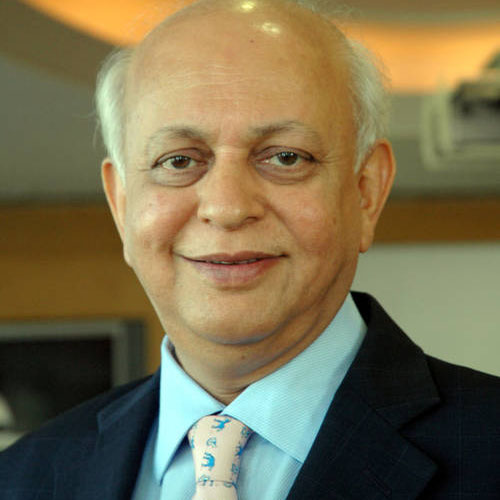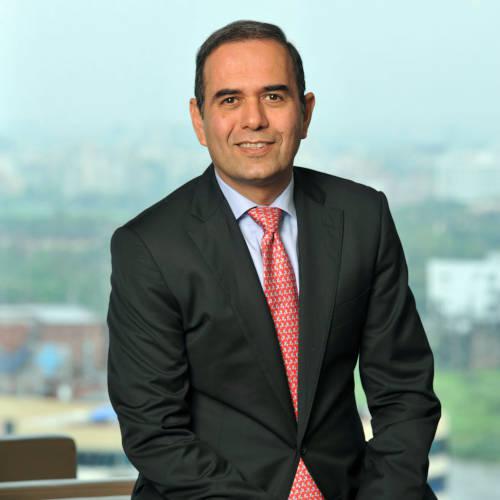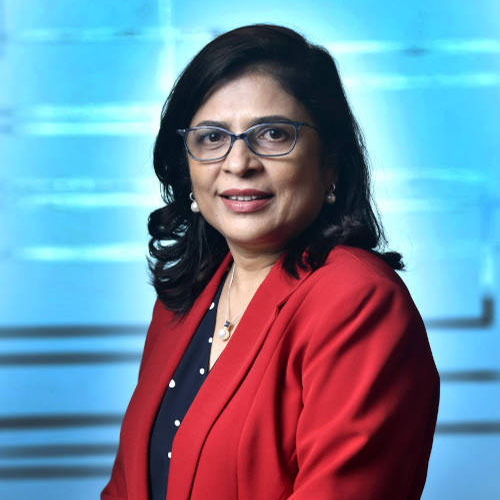-

Deepak is an outstanding professional, a visionary and an entrepreneur
AM Naik, Chairman Emeritus, L&T Group
What was unsaid was that it was also a clarion call to its competitors, present and future, that a financial conglomerate was in the making. It aggressively expanded its services as a provider of home loans where it commanded a 50 per cent market share and leveraged its relations with its 1.7 million customers to venture into other adjacent businesses such as insurance, mutual funds, securities, property, private equity, and more.
At the time, HDFC had a loan book of Rs10,000 crore. A brilliant strategist, Parekh expanded his institutions through mergers and acquisitions. By 1999, HDFC Bank had taken over Times Bank, Home Trust and had a 26 per cent stake in Gruh Finance. Deepak Parekh was Business India’s Businessman of the Year way back in 1996.
While HT Parekh, the founder, had dreamt of facilitating homes for the middle class, in the mid-70s his nephew, Deepak Parekh, took this to another level altogether. What is notable is that Deepak Parekh came from a family of bankers. Conservatism ran in his blood but it was often matched by aggression. The aspirations of the burgeoning middle class to have a home ensured that demand for housing loans remained at an elevated level, and this is likely to continue for several decades.
Even so Parekh, as a means of de-risking the home portfolio, built several adjacent businesses. When RBI advertised for private banks to enter the industry in the 90s, HDFC was amongst the first to get a licence. Likewise, when the doors of insurance were opened, HDFC entered the life and general insurance businesses. It was Parekh’s sincerity and integrity which allowed him to get the best of partners in his many ventures: NatWest for the banking business, Standard Life for insurance, Standard Life Investments for the AMC business, Ergo for general insurance, TCS for outsourcing company Intelenet.
Crisil was also promoted by HDFC in association with SBI and headed by another outstanding professional, Pradip Shah who like Deepak had joined HDFC during its formative years. Over the years it also built a broking business, HDFC Securities; HDFC AMC, a property consulting and brokerage business, and private equity. Parekh was also instrumental in starting a specialised finance institution for infrastructure, IDFC and IL&FS. Unfortunately the latter was mired in problems and is still paying off its creditors.
For a professional with less than 1 per cent stake in the company, building an organisation of this calibre in four decades is no mean achievement. “Deepak is an outstanding professional, a visionary and an entrepreneur,” says AM Naik, chairman emeritus, another professional who scaled the L&T group to towering heights.
“It is indeed a notable achievement for a professional from any sector to build such a great institution. Post the merger, the bank will rank fourth in the world by market cap. Of course, HDFC Bank, like other companies in India has a p/e much higher than global banks due to the sustained year-on-year growth it has been posting. Another trait which Naik finds commendable is Deepak’s lack of ego.
“An attribute which I feel stands out in Deepak is his clear-headedness and decisiveness. It is indeed his vision which has led to the transformation of a start-up to the creation of the fourth largest global bank,” says R Gopalakrishnan, a retired professional who has served in Hindustan Unilever and Tata Sons in a leadership position.
-

One single attribute which I feel stands out in Deepak is his clear-headedness and decisiveness. It is indeed his vision which has led to the transformation of a start-up to the creation of the 4th largest global bank
R Gopalakrishnan, Former Executive Director, Tata Sons; Ex Vice Chairman, Hindustan Lever
Gopalakrishnan says he has known Deepak for 25-30 years when both used to be on the management boards of ICI and Castrol. An author who has penned 17 books, he says: “Deepak is a people’s man. Deepak has high electrical conductivity, high relationship conductivity. Sense and patternmaker in relations. He is always helpful. He will try to do things but will not promise. He has not asked for anything.”
Gopalakrishnan recalls that in the SP Jain Institute Gopalakrishnan and Deepak Parekh once tasked students to identify SHE (sustainable, honest and enlightened) companies. There were barely a few built by professionals which fitted the bill. Besides Deepak Parekh, the names of Harsh Mariwala, ((Marico), AM Naik (L&T), Uday Kotak (Kotak Bank), and Mazumdar-Shaw (Biocon) figured in the study.
A visionary approach
He is passionate about sports as well. Games he enjoys include cricket, bridge and tennis. Parekh loves to visit new places across the globe whenever he has the time. London, where he acquired his ICAEW degree, remains his favourite place. Says Hemendra Kothari, an investment banker who had built DSP Merrill Lynch and is now the chairman of DSP Investment Managers: “I have known Deepak since he was 10. We are more than just family friends. We play bridge and rummy together and have been doing so for several years.”
An ardent lover of cricket Kothari often travels around the globe to see cricket matches. “One trait which I find notable is Deepak’s ability to think clearly not just of the present but of the future. He has a visionary approach and thinks meticulously about everything. That is one of the reasons why there are hardly any NPAs in HDFC,” he says.
Deepak Parekh’s prowess in facilitating M&A deals, advising bankers and industrialists to traverse through sticky issues is legendary. “If not HDFC, Deepak would have been a very, very, successful investment banker. He has an elephantine memory, thinks ahead and values relations,” says Kothari.
Deepak Parekh is not a workaholic. He is active on the social circuit and is often seen at parties in South Mumbai. He does not work 24x7 though he seems to be everywhere. Had he done that he would not have been able to create multiple organisations each respected in their own fields.
Says Conrad Dsouza, one of the seniormost team member in Deepak Parekh’s team: “He used to empower juniors and allow them a chance to interact with senior functionaries of the RBI and Government.“ Dsouza who has been with HDFC for more than four decades having worked in HDFC Treasury adds, “Parekh also used to remind everyone that we are not a promoter driven organisation. We are a shareholders organisation and we require to leave something on the table for them whenever we raise money through IPOs.
Dsouza who had worked closely with Deepak for getting the bank licence says, “It was Parekh’s ‘s decision to give the shares of HDFC Bank at par. His aim was to involve everyone in ownership. Mass Ownership was his mantra.”
He has created a team of equally passionate leaders driving his organisation’s companies. One of his greatest achievements is building a culture of integrity and honesty across his group. This is possible only with the exemplary traits of top-rung leaders. Putting together a team of right-minded people to run the companies has only strengthened their culture. Keki Mistry, an equally competent professional, has been the MD of HDFC since 1997. Nasser Munjee is a professional who was asked to head IDFC.
-

One trait which I find notable is Deepak’s ability to think clearly not just of the present but of the future. He has a visionary approach and thinks meticulously about everything
Hemendra Kothari, Chairman, DSP Investment Managers
Gunit Chadha, ex-MD & CEO of Deutsche Bank, currently the founder of APAC Financial Services, a company providing credit to the underserved, points out: “Deepak has built not one but several institutions all of which are leaders in their respective industries. There must be something in him; some unknown power. He has not been involved in any disputes. He has an unblemished career and is an inspiration to several millions of aspiring professionals.”
Astute judgement of people
Ask Deepak Parekh about this and he would probably laugh. Unknown power, indeed, he would probably say! However, the fact remains that, coming from a family of bankers, Deepak Parekh has been able to look ahead and have the foresight to build a multibillion dollar empire with less than one per cent stake. There are only a handful of professionals who have successfully built such large, and more importantly, such well respected companies, not just in India but globally.
This is one of the reasons why even today FIIs have a 66 per cent equity stake in HDFC. Deepak believes in people and sometime gives creditors (property developers) more leeway especially those facing genuine difficulties or in exceptional cases. His astute judgement of people has more than paid off, with most creditors fulfilling their financial obligations.
Chadha says: “Talent spotting is one of Deepak’s remarkable attributes. He has an eye for spotting talent. All his people are leaders in their own rights. Besides spotting talent, he has also been able to retain them. HDFC does not overpay. But it is the culture which retains talent. Talent has longevity. He has not taken shortcuts in any way. Governance standards across the HDFC Group are par excellence.”
Most leaders have been serving for years at end. Parekh has shown that extraordinary organisations can be created with people. A successful team does not have to have flashy people, high profile celebrities – even ordinary people can contribute to the creation of extraordinary companies.
Deepak is also totally approachable by one and all. Vibha Padhalkar, MD & CEO HDFC Life, who effectively embraced technology to build HDFC Life, an outlier in the industry, says: “One trait which differentiates Deepak from other leaders is his accessibility. In spite of his busy schedule he is accessible to all people, big or small. In a way it is also his way of keeping his pulse on what’s trending. This helps him to build connections and solve problems.”
-

Talent spotting is one of Deepak’s remarkable attributes. He has an eye for spotting talent
Gunit Chadha, Ex-MD & CEO, Deutsche Bank
Besides the time he devotes to his group companies, Deepak Parekh’s advice is sought by one and all. He is on quite a few boards of directors of well-known companies, including GlaxoSmithkline Pharmaceuticals, Siemens, DP World, Fairfax, Mahindra & Mahindra, Indian Hotels and a few more. Besides commercial companies the Government has also sought his advice on various committees or for solving vexatious problems, be it UTI which was once mired in problems or power issues, and so on. Resolving the Satyam imbroglio was one more feather in his cap.
Vimal Bhandari, an independent director on the board of several companies says: “Deepak Parekh is one of a kind and is irreplaceable to any institution. He has been a friend of industry and others including stakeholders. Parekh is frank and will hear everyone patiently. If he can’t do the work, he will be a guide and show the way. His are the sound commercial principles of a banker. He strikes a fine balance between growth and sustainability.”
Several leaders in Corporate India are grateful to him in one way or another. Even head-hunters consult him before finalising top-level hires. This is a trait inherited from his uncle, HT Parekh, who was informally consulted by the top financial heads in the country during the 1992 Banks Scam. Gatherings at Deepak Parekh’s house would include bankers, stock exchange presidents and brokers for late evening meetings. Deepak Parekh has not only followed his uncle’s footsteps but surpassed him in many ways.
An institution builder
N Venkatram, former country head, Deloitte India, says: “Deepak Parekh is the Bhisma Pita (father figure) of the business community, trusted and widely consulted by professionals, businessmen, investors and the government. An institution builder, his ability to create large enterprises across banking, insurance and government and AMC with trust and governance at its core has been instrumental in signalling the emergence of a strong India since the 1990s.”
Deloitte, which had been the auditor of HDFC for several years, closely witnessed the growth of Parekh. Venkatram recalls that in the formative years of private general and life insurance, Parekh played an exceptional role. “It was his ability to bring in investors and alliance partners to India which over time created unimaginable individual security and national wealth.” On a personal note, he points out Parekh “has a warm, caring approach to the people and organisation he led, fostering an overall culture of care and commitment which makes them so special”.
Deepak Parekh, in his last letter to his shareholders, mentioned that he was hanging his boots. Vimal Bhandari says, Parekh’s retirement will mark the end of a generation. Naik feels differently: “I do not think he will keep quiet. He will find something which he likes and will continue to do more and more for society.” Naik himself has been fully immersed in doing something for the community, having used his own funds to build hospitals and training institutes.
-

One trait which differentiates Deepak from other leaders is his accessibility
Vibha Padhalkar, MD & CEO, HDFC Life
Insiders believe Deepak will be spending more time in growing the HT Parekh Foundation which was created after the latter’s death. Parekh will also be sought after by companies and industrialist for his advice on corporate matters as also family business and more.
If insiders are to be believed, quite a few corporates, have already offered space to Deepak to carry on whatever he chooses to do in their office buildings. It would however be surprising if Parekh is not allowed to continue in his earlier office.
Like a true leader, Parekh has ensured that the legacy created by HDFC lives on. There are other, equally large institutions which are currently grappling with succession. These include Reliance Industries, HUL and Kotak Bank.
Leaders from the next generation have already been groomed to take over Reliance Industries and Kotak Mahindra Bank. In case of HUL, a new professional groomed from inside and he will be taking over the reins from Sanjiv Mehta, another CA who has been with HUL for around 35 years. He has been the CEO for the past few years.
Will the leaders of today be able to replicate the creation of another HDFC structure with immense wealth for all its stakeholders? A difficult question. But certainly it is unlikely to be achieved in the same manner as Deepak, with kindness and fairness. Even if there are organisations globally that can create such wealth, it is unlikely to be done in such a selfless manner.
Many shareholders who had reposed faith and trust in HDFC over the years have been rewarded handsomely and are today wealthier than Parekh himself. That era has come to an end and is now consigned to history.
-

Deepak Parekh is the Bhisma Pita of the business community, trusted and widely consulted by professionals, businessmen, investors and government
N. Venkatram, Former country head, Deloitte India
Mega Merger
Merger creates one of the largest bank globally
Effective 1 July, HDFC has ceased to exist. Shareholders of HDFC, will get 42 shares for every 25 shares held in the company. 12 July is the last date for determining the entitlement of the shares for HDFC. HDFC holds 20.9 per cent stake in HDFC Bank. This will get cancelled out and HDFC Bank’s balance sheet will shrink to that extent.
The market cap of HDFC is currently Rs5.3 lakh crore while that of HDFC Bank is Rs9.62 lakh crore. If 21 per cent of shares of HDFC in the bank gets cancelled the combined market cap would be around Rs13.8 lakh crore. At the current exchange rate (Rs81.90 to a dollar) in dollar term it will be $169 billion.
With the stock markets on a tear in India the market cap ahead of the actual merger may go up still further. Even at the current market cap of $169 billion, HDFC Bank would be the fourth largest bank by market cap in the world behind JP Morgan, Bank of America, and the Industrial and Commercial Bank of China. Of course p/e of HDFC Bank is high with lot of expectations of growth being inbuilt in the price.








































